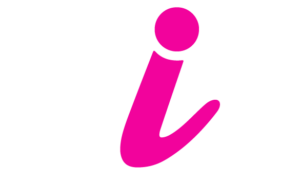How Transferable Skills from Diverse Backgrounds Lead to Sales Success
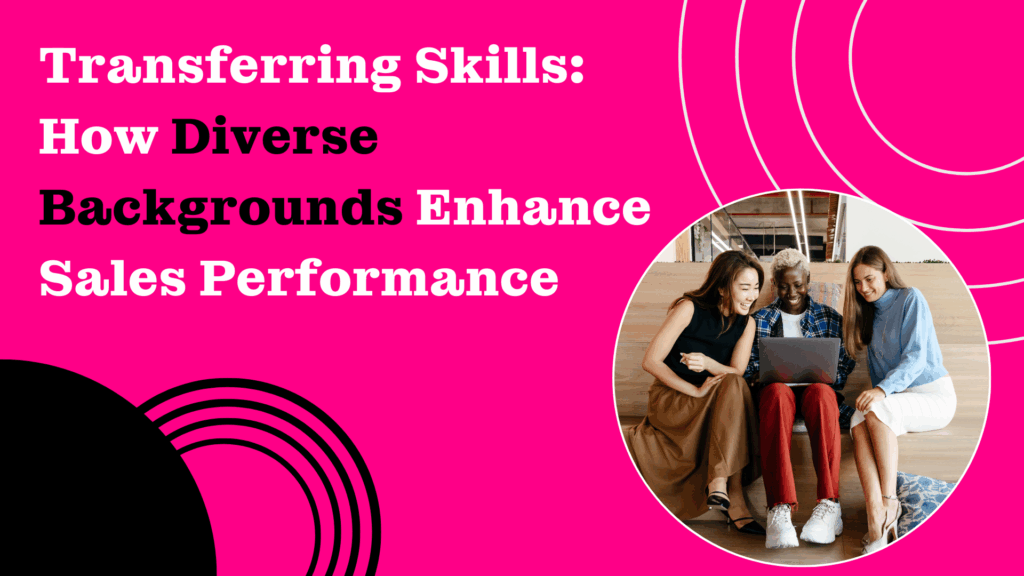
Success in sales doesn’t come from following one set path, it comes from leveraging the full range of experiences that shape who you are. For women of color especially, entering or growing within the sales world often means bringing a rich, diverse background—one that includes leadership in other industries, entrepreneurial grit, community-building skills, advocacy, creativity, and resilience forged in spaces where we had to lead without formal titles. And here’s the truth: those experiences aren’t detours. They’re your competitive edge. Today’s buyers don’t just want polished pitches—they want authenticity, perspective, and people who understand real needs in a complex world. Your lived experiences are the differentiator that can open doors, close deals, and build trust faster than any textbook technique. Why Diverse Career Paths Create Stronger Sellers Sales isn’t just about product knowledge or polished scripts. It’s about relationships, trust, problem-solving, and adaptability. If you’re coming into sales from a different field, whether it’s education, healthcare, retail, marketing, nonprofit leadership, or the arts, you’re already bringing skills many traditional reps have to work hard to develop: Relationship-Building Teachers know how to read the room. Healthcare workers know how to navigate urgency and trust. Community organizers know how to align stakeholders. Every one of these skills maps directly to high-impact selling. Problem-Solving Under Pressure If you’ve managed projects, mediated teams, handled crises, or built strategies from scratch, you already know how to stay calm, solution-oriented, and focused when challenges arise. Storytelling and Influence Artists, marketers, writers, and activists understand the power of a story well told. In modern sales, being able to frame a solution within a compelling narrative is everything. Resilience and Emotional Intelligence If you’ve ever had to advocate for yourself or others in difficult spaces, you have resilience baked into your DNA, and emotional intelligence that buyers today crave in a sales partnership How Diverse Experience Builds Strategic Advantage Your previous roles did more than fill your résumé. They sharpened the exact skills that top sellers rely on every day. When you’ve worked across different industries or functions, you’re not just carrying knowledge. You’re carrying strategy, nuance, and the ability to see patterns others might miss. Diverse experience doesn’t just make you relatable. It makes you resourceful. Here’s what that looks like in sales: You anticipate needs sooner Coming from fast-paced or high-empathy roles like healthcare, education, or nonprofit leadership means you’ve had to make decisions with limited information. That intuition helps you identify buyer pain points early and ask smarter discovery questions. You solve creatively, not just quickly If your background includes problem-solving in complex systems like navigating red tape in public institutions or building community initiatives on limited budgets, you bring innovation that isn’t bound by how it’s always been done. You connect more authentically Sales isn’t just about what you pitch. It’s about how you listen. Diverse professional journeys teach you to meet people where they are. That’s what builds trust and long-term partnerships. You adapt faster under pressure If you’ve ever pivoted careers, managed competing responsibilities, or operated without a roadmap, then resilience and adaptability are already part of your toolkit. That gives you an edge when deals stall, markets shift, or strategies change. Your past roles weren’t detours. They were development. The range you’ve built across industries, teams, and challenges is what makes you not just a seller but a standout. How to Position Your Past as a Power Move If you’re coming from another industry (or a non-traditional path), own it boldly. Here’s how: Tell the story in outcomes. When you talk about your background, focus on transferable wins. “In my previous role, I led X initiative, which increased retention by 20%.” or “I managed a caseload of 150 clients while maintaining a 98% satisfaction rate.” Connect skills to sales outcomes. Draw the line clearly: “My experience in education honed my ability to build trust quickly and communicate complex ideas clearly. These are skills I now use daily in enterprise sales conversations.” Frame it as an advantage, not an apology. Your diverse journey gives you range, grit, and insight that can’t be manufactured. Make sure buyers and hiring managers see it as a value add, not a gap. Your Journey is Your Advantage There is no single “perfect” path into sales. Success isn’t about fitting a mold; it’s about bringing more voices, experiences, and perspectives to the table, especially in a world as complex as the one we’re selling into. You are not starting behind. You are starting with strengths others are still working to build. Your resilience, adaptability, and lived experience don’t just make you qualified…they make you an asset. They allow you to see opportunities others miss, build trust more deeply, and solve problems in ways that feel real and human. Your path has prepared you for this moment. It’s not something to overcome. It’s the reason you’re ready. Your resilience, your range, your lived expertise make you not just a good rep but a transformational one. Ready to Take It Further? At Sistas in Sales, we believe your story is your superpower. Whether you’re pivoting into sales for the first time, scaling to leadership, or bringing decades of cross-industry experience into a new role, you deserve to be in spaces where your background is seen as a strength—not a question mark. Join the Sistas in Sales community to access mentorship, leadership development, skills training, and a network of women who know the power of bringing every part of their journey to the table. And don’t miss the upcoming SIS Summit. It’s the premier gathering where women of color in sales come together to build skills, celebrate wins, and expand their careers on their own terms. Expect bold conversations, actionable workshops, leadership pathways, and a community that sees your full potential. Own your path. Own your power. Build your legacy. See you at Summit 2025.
Sustainable Success: How to Build a Sales Career That Evolves With You
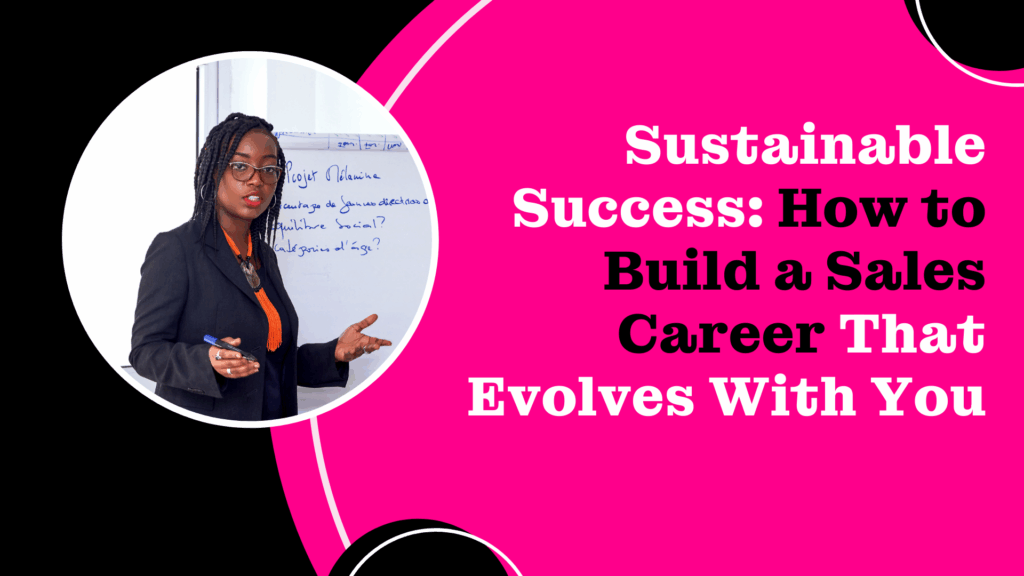
Sales is often framed as a sprint. Hit the numbers. Push through the pressure. Grind hard, rest later. But here’s the truth: That model burns people out, especially women of color who are navigating both professional and cultural pressures in high-performance environments. Your sales career deserves more than a burnout cycle. It deserves strategy, sustainability, and space to evolve as you do. This is not just a job. This is a career. And a sustainable career means doing work that energizes you, builds your skills over time, and aligns with the life you’re creating—not just the goals you’re chasing. Be Productive, Not Overextended Productivity isn’t about packing your calendar or always being available. It’s about staying focused on what actually moves the needle and letting go of the noise. You don’t need to earn your value through exhaustion. The constant hustle, the back-to-back calls, the late-night follow-ups? Those are signs of misalignment, not ambition. You are allowed to pause, recalibrate, and redefine what a productive day looks like for you. Start here: Time-block your most focused hours for strategic work, not just calls or meetings Schedule your priorities, not just your tasks Let AI or automation help you streamline follow-ups and reporting Protect time for thinking, planning, and rest—because clarity requires space Productivity should support your well-being, not compete with it. When you manage your energy with intention, you do more of what matters and less of what drains you. Think Long-Term: Redefining Sales Success You didn’t come this far to burn out halfway through. Sales is intense, but it can also be a long, rewarding journey if you build it on your terms. Sustainable success means designing a career that grows with you, not one that demands you shrink to fit it. That might mean stepping into leadership, shifting into a new industry, taking a sabbatical, or pivoting into a role that aligns better with your values. Sustainability looks like: Taking real time off and honoring it without guilt Having honest conversations about your bandwidth Seeking sponsors who advocate for your growth and protect your potential Allowing your goals to evolve as your life evolves Your ambition does not expire when your priorities shift. It sharpens. It becomes more intentional. You are allowed to change your mind. You are allowed to grow. You are allowed to define success in ways that reflect who you are now—not just who you were when you started. Your Career Should Honor Your Life, Not Override It Sales should not come at the cost of your peace, your health, or your identity. The job is important, but so is your joy. So is your family. So is your rest. A career worth having is one that creates room for your wholeness—not just your performance. You are not here to prove yourself endlessly. You are here to build something that lasts. That might mean logging off when you said you would. Saying no to work that doesn’t align with your values. Making time for the things that recharge you. Or redefining your goals to reflect what success actually feels like, not just what it looks like from the outside. This is not a sprint. It’s a rhythm. One that adjusts to you, not the other way around. Ready to Grow With Us? You’re building a career that reflects your vision, not just your role. And that takes community, clarity, and care. At Sistas in Sales, we believe you should not have to choose between performance and peace. We offer the space, resources, and sisterhood to help you grow your sales career in a way that is strategic, sustainable, and aligned with who you are. Join us at the Sistas in Sales Summit 2025. This is where goals meet grounding. Where growth feels personal and collective. Where women of color in sales come together to connect, learn, and lead with power and purpose. Build a career that honors all of you. We’ll meet you there.
Building Resilience in Sales: Strategies to Thrive Amid Rejection and Market Changes
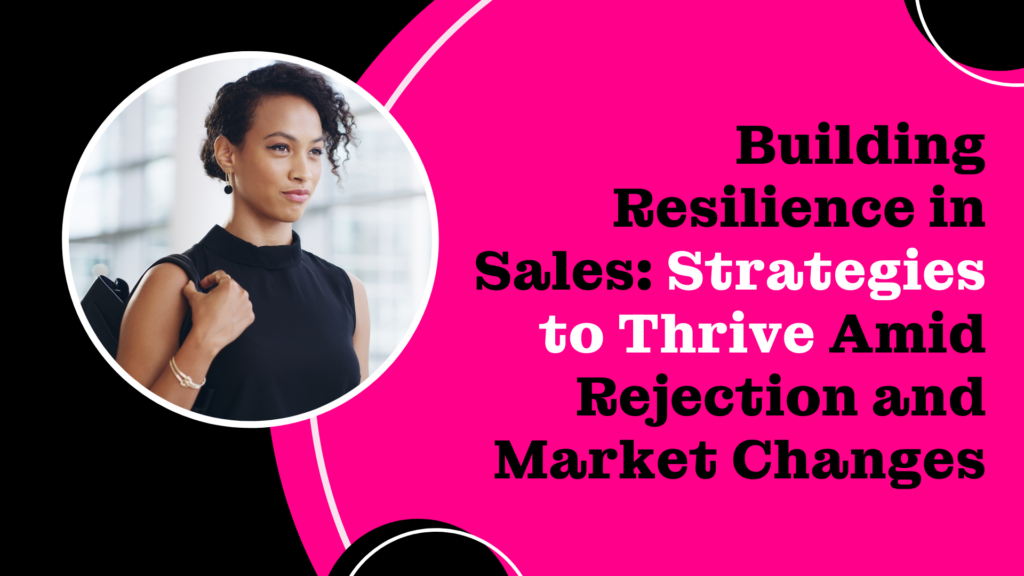
Sales isn’t for the faint of heart—and we don’t say that to scare anyone. We say it because it’s true. Targets are rising. Markets are shifting. Buyers are cautious. And rejection? It’s part of the job. But for women of color in sales, there’s another layer: navigating professional pressure while also managing the silent weight of being underestimated, overlooked, or “the only” in the room. That’s why resilience isn’t just a mindset—it’s a muscle. One that can be trained, sharpened, and strengthened over time. Whether you’re facing another “no,” dealing with a slow quarter, or adapting to a shifting industry, these strategies are designed to help you not just bounce back—but rise, evolve, and thrive. Reframe Rejection as Redirection Let’s start with the hardest truth: rejection is inevitable. But here’s the reframe—it’s also information. It’s data. It’s direction. Instead of internalizing a lost deal as a failure, start asking different questions. What did I learn? What patterns do I notice? What part of the conversation could I fine-tune next time? You’re not just hearing “no.” You’re gathering insight. And the faster you reframe, the faster you grow. Try this: Keep a “resilience tracker” where you log rejections and write down one takeaway for each. Over time, you’ll see growth—not just grit. Adaptability Is Your Advantage Watch for the signs—your adaptability is often triggered by what no longer works the way it used to. That doesn’t mean you’re off your game—it means the game has changed. The most resilient sales pros know how to spot the signals early and shift before the impact hits their numbers. Your usual scripts aren’t converting. The talk tracks that used to land with ease now feel flat. Prospects are less responsive. You’re not getting callbacks, or your close rate is slipping. That’s a sign your language, timing, or offer might need to evolve with your buyer’s mindset. What’s changed in their world? What external pressures (economic, competitive, tech-related) might be influencing their hesitations? Buyer objections have shifted. Where buyers used to say, “We don’t have budget,” they’re now saying, “We’re pausing all new vendor conversations.” Or, “We need a clear ROI in 30 days.” Objections reveal priorities. If those priorities are changing, your pitch—and your prep—needs to change too. Start collecting and analyzing objections in real time. What are buyers really worried about right now? Build new language that speaks directly to those pain points. Your product is being positioned differently. Maybe your company is leaning into a new use case. Maybe your product roadmap shifted. Maybe your marketing team is highlighting different benefits. If the messaging around your product is evolving, your sales strategy has to evolve too. Stay close to product and marketing teams. Ask for the “why” behind the shift, and adapt your conversations to reflect the new narrative. Once you’ve spotted the shift, don’t freeze—adapt. Too many sellers try to force outdated messaging because it worked once. But resilience isn’t about holding on—it’s about letting go of what no longer works and being willing to try something new. Run small experiments. Test a new email subject line. Lead with a different insight. Open with a bolder question on your next call. These small shifts help you stay agile without waiting for permission or a playbook update. Pivot early. Test often. Trust your instincts. You’ve got experience, insight, and data on your side. Use them to stay one step ahead—not just of the market, but of the version of you who’s still playing by yesterday’s rules. But even the sharpest strategy needs support. Resilience is built faster—and held stronger—when you’re surrounded by people who truly understand the journey. Ground Yourself in Community You weren’t meant to do this alone. When the pressure’s on, community isn’t just support—it’s strategy. It’s the space where you can exhale, reflect, and be reminded that your challenges are valid—and solvable. That’s why being part of a network like Sistas in Sales matters. It’s not just about access—it’s about affirmation. It’s where you can process a hard week, role-play a new talk track, or hear from someone who’s been there and bounced back better. Want to keep growing in a space that gets it? SIS membership offers events, mentorship, resources, and real-time connection to a community that’s invested in your success. Commit to Continuous Learning Resilience isn’t just about getting through the tough moments—it’s about sharpening your edge so you’re ready for what’s next. It’s the ability to stay curious when things get uncertain, to keep evolving even when results feel stalled, and to invest in yourself consistently—not just when it’s convenient. Make learning part of your process—not as a side project, but as a built-in part of your growth strategy. You don’t need hours or expensive certifications. You need consistency and intention. Listen to a podcast during your commute or while making dinner. Sign up for a micro-course on AI to learn how emerging tech can support your pipeline. Read 10 pages of a sales book before bed to shift your mindset before tomorrow’s call block. Learning builds confidence. Confidence builds momentum. And momentum builds results. Here’s a starting lineup to fuel your development: Podcast: Women in Sales by Barb Giamanco – Real, unfiltered conversations about navigating leadership, strategy, and bias in sales as a woman. Book: Emotional Agility by Susan David – A guide to managing your inner world with clarity and resilience, especially when under pressure. Tool: ChatGPT – Use it to draft emails, practice objection handling, role-play discovery calls, or get quick summaries on unfamiliar industries. The more you invest in sharpening your skills and mindset, the more prepared you’ll be to thrive through uncertainty—not just survive it. Daily Practices That Strengthen Your Resilience Muscle Resilience isn’t only built in the big moments—it’s cultivated in the quiet, intentional choices you make every day. The more consistent your habits, the more stable your mindset. And in sales, that inner stability becomes your superpower. Here’s how to build it: Check in with yourself daily: Before
Cross-Functional Collaboration: Bridging Sales, Marketing, and Product Development
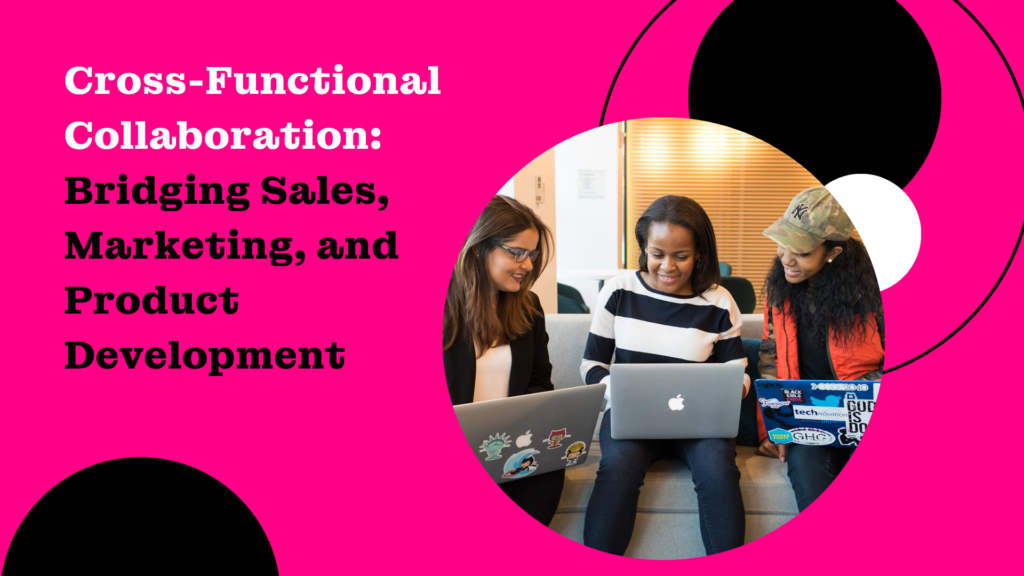
Cross-functional collaboration isn’t a buzzword—it’s a business imperative. In today’s competitive landscape, the companies leading their industries aren’t just selling better; they’re aligning better. Sales, marketing, and product development must operate as a unified front, not disconnected departments with competing priorities. For professional women of color in sales, understanding and driving this alignment is more than a value-add—it’s a leadership move. When these three functions work in sync, the impact is measurable: shorter sales cycles, more relevant campaigns, and solutions that meet real customer needs. But true collaboration requires more than calendar invites or shared docs—it demands a shift in how teams communicate, strategize, and center the customer. Start with Shared Goals Sales is focused on conversion and revenue, marketing on brand visibility and demand generation, and product on innovation and usability. These priorities may differ in scope, but they’re united in purpose: delivering value to the customer. That alignment only happens when teams co-create goals around the full customer journey, not just individual KPIs. Quarterly planning sessions, mutual accountability metrics, and shared definitions of success are essential in creating alignment that lasts. Speak Each Team’s Language The most effective sales professionals know how to communicate beyond the pitch. That means understanding how marketers think about funnel strategy or how product teams prioritize sprints. Translating sales data into actionable insights—like patterns in lost deals, product feedback from clients, or objections heard in demos—builds credibility and drives influence. When you can bridge that language gap, you stop being a voice from another department and start becoming a trusted strategic partner. Champion the Voice of the Customer No one has a clearer pulse on the customer than sales. You hear the concerns, the aspirations, the blockers—and you hear them in real time. That insight is a competitive advantage, and when it’s shared across teams, it can inform smarter product decisions and more compelling marketing. But it’s not just about relaying what customers say. It’s about representing perspectives that are often overlooked. Women of color in sales bring different lived experiences, informing an emotional intelligence and observations that can illuminate nuances others might miss. That perspective matters—not just in who we serve, but in how we build. Make Collaboration a Habit, Not a Handoff Collaboration isn’t a project milestone—it’s a rhythm. Building consistent, repeatable opportunities for collaboration turns alignment into a cultural standard. That could look like recurring cross-functional standups, shared dashboards for tracking customer trends, or co-led campaigns. But structure alone won’t sustain collaboration—relationships will. Invest in trust. Understand your counterparts’ pressures. Lead with partnership, not requests. Lead with Inclusion Inclusion is not an add-on to collaboration; it’s the foundation. When diverse perspectives are part of the planning, strategy, and decision-making process, the outcomes are richer, more relevant, and more sustainable. As women of color in sales, our leadership in cross-functional work is not only about driving results—it’s about reimagining what leadership looks like. By showing up with clarity, empathy, and strategic insight, we set new standards for collaboration and collective success. The future of sales isn’t siloed. It’s interconnected, intentional, and inclusive. And it will be shaped by those bold enough to lead beyond their lane. At Sistas in Sales, we’re building a community of women who are not only closing deals but driving cross-functional strategy, amplifying the voice of the customer, and showing up as powerful connectors across departments. If this sounds like you—or who you’re ready to become—membership gives you the tools, network, and access to take your impact to the next level. And there’s no better place to step into that power than the Sistas in Sales Summit this September. Join hundreds of high-performing women of color in sales, marketing, and product for three days of leadership development, industry insights, and the kind of real-talk collaboration that drives transformation. If you’re ready to lead across teams, shape the future of work, and do it all in community—you belong here. Become a SIS member. Join us at Summit. Build what’s next, together.
Building and Leading Diverse Sales Teams
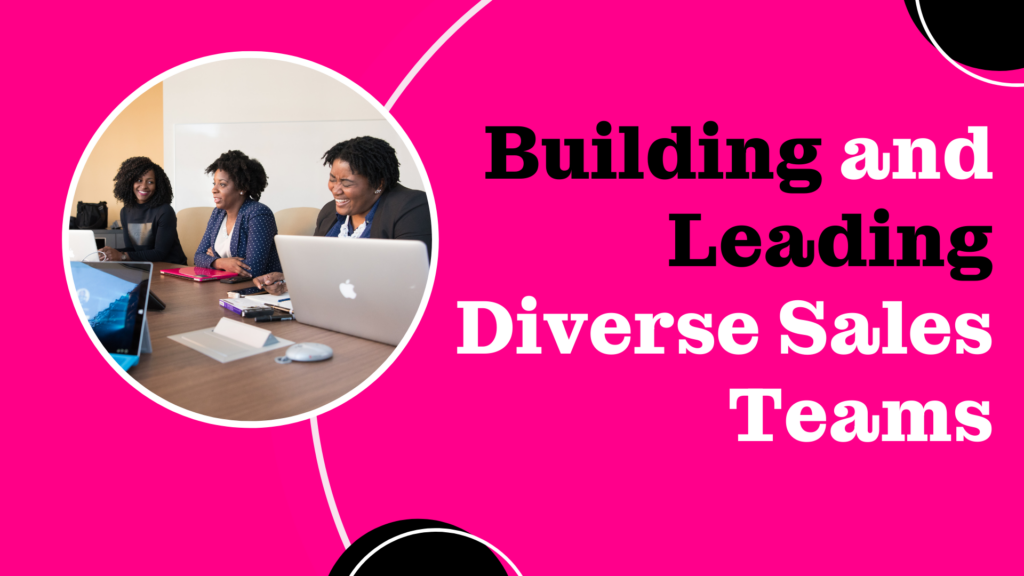
The current political climate has brought a wave of disappointing announcements from business leaders. Under the pressure or approval of shifting political winds, many companies are rolling back their diversity, equity, and inclusion (DEI) initiatives. These rollbacks reveal a disheartening truth: some organizations never truly believed in the value of diversity, only adopting DEI programs when they were politically expedient. Now, with public statements villainizing intentional efforts to build diverse workforces, they falsely claim that prioritizing diversity equates to discrimination or hiring less-qualified individuals. Let’s be clear: the data tells a different story. Diverse teams consistently outperform their less-diverse counterparts. They create better products, foster more innovation, and drive greater revenue and profit margins. Moreover, it has never been true that prioritizing diversity means sacrificing qualifications. It simply means seeking out the best talent, including candidates who may have been overlooked due to unconscious bias, and ensuring opportunities are distributed equitably. For sales leaders, diversity is not just a moral imperative—it’s a strategic advantage. Let’s explore how to build and lead diverse sales teams that drive better results and create a more equitable workplace. The Benefits of a Diverse Sales Team Enhanced Problem-Solving and Innovation A team composed of individuals with different backgrounds, experiences, and perspectives brings a wealth of ideas to the table. Diverse teams are better equipped to approach problems creatively and develop innovative solutions, giving them a competitive edge. Improved Customer Understanding A diverse sales team mirrors the diversity of today’s global market. Team members who share cultural or lived experiences with clients are better positioned to build trust, understand pain points, and offer tailored solutions. Increased Employee Engagement and Retention Inclusive workplaces foster a sense of belonging. Employees are more likely to stay with companies where they feel seen, valued, and supported. Better Business Outcomes Studies show that companies with diverse teams perform better financially. According to McKinsey, companies in the top quartile for racial and ethnic diversity are 35% more likely to have financial returns above their industry medians. Building a Diverse Sales Team Reevaluate Hiring Practices Expand your talent pool: Partner with organizations like Sistas in Sales, recruit from historically Black colleges and universities (HBCUs), and attend diversity-focused job fairs. Create inclusive job descriptions: Use language that attracts a wide array of candidates and avoids unintentional bias. Diversify your interview panels: Include team members from varied backgrounds to ensure fair assessments. Set Measurable Diversity Goals Establish clear benchmarks for diversity and track progress over time. These goals should be realistic, actionable, and aligned with broader business objectives. Invest in Talent Pipelines Develop internships, mentorship programs, and scholarships targeting underrepresented groups to nurture talent from an early stage. Mitigate Unconscious Bias Implement training to help hiring managers recognize and counteract biases. Using structured interviews and blind resume reviews can also reduce bias in the hiring process. Creating an Inclusive Culture Foster Belonging Create employee resource groups (ERGs) or affinity groups where team members can connect and share experiences. Openly celebrate diversity through events, milestones, and cultural holidays. Prioritize Equity Regularly audit compensation, promotions, and opportunities to ensure fairness across all demographics. Provide flexible work arrangements that accommodate diverse needs and responsibilities. Encourage Open Dialogue Facilitate conversations about diversity, inclusion, and equity. Leaders should model vulnerability and actively listen to team members. Provide Continuous Learning Opportunities Host ongoing DEI training and workshops to reinforce the importance of inclusion. Encourage team members to share insights and best practices. Dismantling Bias to Build Better Teams Prioritizing diversity in hiring isn’t about lowering standards—it’s about raising them. It’s about recognizing and addressing unconscious biases that may prevent us from seeing the best candidates. By focusing on diversity, you’re building a team capable of creating products and services that resonate with broader audiences, thanks to the richness of their collective experiences. The benefits are clear: diverse sales teams perform better, foster innovation, and enhance customer relationships. As leaders, it’s our responsibility to build equitable workplaces that reflect the world we serve. Together, we can create teams that not only achieve outstanding results but also pave the way for a more inclusive future.
Effective Sales Pitch Techniques

A compelling sales pitch can be the key to closing deals, building trust, and setting yourself apart in a competitive sales environment. It’s more than just presenting a product or service—it’s about connecting with your audience, solving their problems, and leaving a lasting impression. To create a pitch that sticks, you need strategy, storytelling, and skillful delivery. Here’s how to craft and deliver an effective sales pitch that drives results. Understand Your Audience Inside and Out Before you pitch, you need to understand who you’re talking to and what matters most to them. Tailoring your approach to the audience’s needs increases the likelihood of a successful outcome. Do Your Research: Dig into your prospect’s company, their industry, and their pain points. What challenges do they face? How can your solution help them succeed? Ask Questions: If you have the opportunity, gather insights during pre-pitch conversations to identify their goals and concerns. Make It Personal: Avoid generic messaging. Address your audience’s specific situation and show that you understand their world. For instance, McKinsey highlights the importance of creating customer-centric sales strategies that focus on addressing real needs rather than pushing products blindly. Lead with Value, Not Features The best pitches don’t dwell on technical details—they focus on value. Prospects care less about what your product does and more about how it will help them succeed. Focus on Outcomes: Start with the end result. How will your product or service make their life easier, improve revenue, or solve a pressing problem? Share Tangible Results: Use numbers or specific benefits to illustrate impact. For example, “Our platform increases pipeline visibility, helping teams close 20% more deals in half the time.” Connect Emotionally: Value isn’t always about money. Talk about saving time, reducing stress, or gaining a competitive edge. The key is to make prospects see how your solution will help them win. Research by HubSpot indicates that tying value to a buyer’s personal goals and company objectives creates stronger engagement. Tell a Story That Resonates People remember stories more than statistics. Stories make your pitch relatable, engaging, and memorable. They help you move beyond selling and into connecting. Problem → Solution → Success: Frame your pitch around a clear story structure. Share a challenge faced by a similar client, how you helped them, and the success they achieved. Include Real People: Use customer testimonials, anecdotes, or case studies to make your story authentic. Make It Vivid: Describe the situation with detail, but keep it concise. Use emotional or visual language to help prospects see the story unfold. A good story doesn’t just share results—it helps your audience imagine themselves achieving similar success. Perfect Your Delivery The most thoughtful pitch will fall flat if your delivery isn’t strong. Confidence, clarity, and charisma can take a good pitch to the next level. Practice, Practice, Practice: Rehearse until you’re comfortable. Anticipate potential questions and prepare responses to maintain control of the conversation. Be Clear and Concise: Respect your prospect’s time. Keep your pitch direct and focus on what matters most to them. Engage Your Audience: Ask questions, make eye contact (if virtual, turn on your camera!), and watch for body language cues to adapt in real time. End with a Strong CTA: A clear next step keeps the conversation moving. Whether it’s booking a follow-up meeting, sharing a proposal, or trying out a demo—make the ask. Adapt to Virtual Sales Environments With virtual meetings now the norm, sales professionals must adapt their techniques for digital platforms. Turn Your Camera On: Your prospects want to see a real person, not just hear a voice. Seeing your energy and body language fosters trust and connection. Optimize Your Setup: Use good lighting, a clean background, and a strong internet connection to maintain professionalism. Engage Virtually: Use tools like polls, visuals, or live demos to hold attention and keep prospects actively involved. SIS Sponsor Gartner has research illustrating that virtual selling is here to stay, with 80% of B2B interactions now occurring online. The ability to master virtual delivery will set top sellers apart. Follow Up with Impact Your pitch doesn’t end when the meeting does. A strong follow-up can reinforce your message, address concerns, and keep the momentum going. Summarize the Conversation: Send a recap email highlighting key takeaways, next steps, and your value proposition. Personalize Your Follow-Up: Reference specific points from the conversation to show you were listening and tailor the message to their goals. Provide Additional Value: Share case studies, articles, or product information that further supports how you can solve their problems. Effective follow-ups show that you’re proactive and invested in their success, increasing the likelihood of a positive outcome. Master Your Pitch with SIS An effective sales pitch combines preparation, value, storytelling, and strong delivery. Whether you’re pitching virtually or in person, these techniques will help you connect with your audience and close more deals. Looking to sharpen your sales pitch further? Join the Sistas In Sales (SIS) community for exclusive resources, coaching, and mentorship opportunities that help you elevate your sales game and achieve your goals.
Tips for Virtual Sales Meetings & Pitches

In the era of remote work, virtual meetings have become the norm rather than the exception. Sales professionals are expected to excel in this environment, not just because it’s convenient but because it’s a vital way to connect with clients, expand networks, and close deals. Whether you’re pitching to a prospective client or meeting with a long-standing partner, how you present yourself virtually can make or break the sale. Here are actionable tips to help you master your next virtual sales meeting or pitch. 1. Preparation Is Your Foundation Preparation is the bedrock of any successful meeting, virtual or otherwise. Always Test Your Tech: Double-check your camera, microphone, and internet connection before the meeting. If you’re sharing your screen, ensure the files or tabs you need are ready to go. Set the Stage: Your background matters—choose a tidy, professional space. Use a virtual background only if it aligns with your brand and doesn’t distract from your message. Plan for Presence: Have your camera on. Let your prospects see your energy and connect with you as a real person. This visual connection builds trust, makes your body language visible, and allows you to read their reactions and adjust in real-time. Know Your Audience: Research your prospect thoroughly. Understand their pain points, goals, and how your solution aligns with their needs. 2. Build Connection from the First Click Building rapport virtually takes intention and effort. Start with Small Talk: Open with something light to ease into the conversation—compliment something about their work, mention a relevant topic, or simply ask how they’re doing. Engage Visually and Verbally: Make eye contact with the camera to simulate in-person connection. Use natural hand gestures and facial expressions to project confidence and warmth. Actively Listen: Nod, affirm, and ask follow-up questions to show you’re engaged and genuinely interested in what they’re saying. 3. Make Your Pitch Memorable Your presentation should capture attention and leave a lasting impression. Keep It Visual: Use slides, videos, or demos sparingly but effectively to complement your points. Visual aids should enhance, not overshadow, your narrative. Tailor Your Message: Speak directly to your prospect’s needs and highlight specific ways your product or service solves their unique challenges. Be Concise: Virtual environments amplify short attention spans. Get to the heart of your value proposition quickly and leave room for questions or discussion. 4. Overcome Objections with Grace Handling objections well demonstrates your expertise and builds trust. Listen First: Let your prospect fully express their concerns before responding. This shows respect and ensures you’re addressing the right issues. Acknowledge Valid Points: Agree where appropriate and provide solutions or reassurances tailored to their concerns. Come Prepared with Proof: Share success stories, case studies, or data to bolster your credibility. 5. Foster Engagement Throughout Keeping your audience involved ensures a productive and memorable meeting. Use Interactive Features: Leverage tools like polls, chat boxes, or collaborative whiteboards to engage your audience actively. Check for Understanding: Pause periodically to ask if they have questions or if they’d like further clarification on a point. Be Mindful of Energy Levels: If the meeting runs long, suggest a quick stretch break or find natural transition points to re-energize the conversation. 6. Follow Up to Seal the Deal The meeting may end, but the work doesn’t stop there. Send a Recap Email: Summarize key takeaways, clarify next steps, and attach any promised resources. Share Supporting Materials: Provide relevant case studies, a link to your product demo, or further reading that reinforces your pitch. Schedule a Next Step: Proactively propose a follow-up meeting or actionable next step while the momentum is fresh. Your Virtual Edge Virtual meetings may not be new, but their importance has never been greater. By presenting yourself professionally, connecting authentically, and communicating effectively, you can stand out in any sales scenario. With consistent practice and the right tools, virtual selling can become one of your strongest assets in today’s competitive landscape. Want more strategies to elevate your sales game? Join the Sistas in Sales community for access to exclusive resources, expert-led events, and a network of women committed to helping you achieve your goals. Unlock your potential with SIS—your next big breakthrough could be one connection away!
How Collaboration in Sales Drives Performance and Revenue Growth
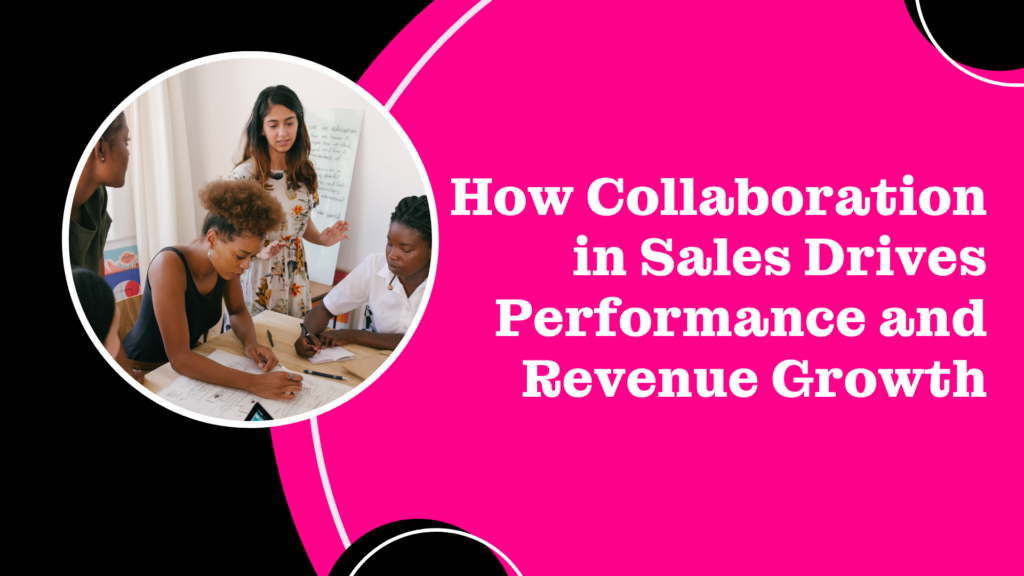
Sales is often seen as a competitive and individualistic field, but the most successful teams know the power of collaboration. A supportive and unified sales environment not only improves results but also fosters innovation, enhances relationships, and drives personal and professional growth. For women of color in sales, creating spaces of collaboration is especially impactful, offering community and shared knowledge in environments where representation can feel limited. The Challenges of Collaboration in Sales The inherent competitiveness of sales can make collaboration feel like a lower priority. Team members may focus on their individual goals, hesitate to share strategies, or struggle to build trust across departments. For underrepresented groups, these challenges can feel even more pronounced when systemic inequities limit access to allies or create additional barriers to success. Addressing these issues means building an environment that values all voices and prioritizes collective growth over individual competition. Key Components of a Collaborative Sales Environment Open Communication: Encourage transparent and constructive conversations. Create opportunities for team members to share strategies, ask questions, and celebrate wins in an environment that feels safe and supportive. Shared Goals: Unite your team under common objectives that recognize and reward both individual contributions and collective achievements. This builds alignment and fosters a stronger sense of community. Knowledge Sharing: Establish spaces and systems where lessons learned, successes, and best practices are easily shared. Whether through mentorship, team workshops, or informal check-ins, knowledge exchange strengthens everyone. Mutual Accountability: Build trust by creating a culture of shared responsibility. When team members support one another and hold each other accountable, they reinforce the importance of collaboration. Recognition and Incentives: Celebrate teamwork as much as individual success. Recognizing group achievements shows the value of collaboration and motivates your team to keep working together. Strategies to Build Collaboration Leverage Technology to Unite Teams: Implement tools that support seamless communication and collaboration, such as CRM platforms and project management systems. These tools can help break down barriers and make teamwork more efficient. Create Cross-Functional Partnerships: Encourage collaboration beyond the sales team by working with marketing, customer success, and product development. These relationships enhance the customer experience and generate more cohesive strategies. Solicit Feedback and Act on It: Regularly ask for team input through meetings, surveys, or one-on-one sessions. Feedback creates a two-way conversation that fosters trust and reveals opportunities for stronger collaboration. Lead with Transparency and Inclusion: Sales leaders play a critical role in setting the tone for collaboration. Demonstrate openness, encourage teamwork, and ensure that every team member feels their contributions are valued. The Benefits of Collaboration A collaborative sales environment delivers transformative benefits, including: Enhanced Creativity: Combining diverse perspectives inspires innovative ideas and problem-solving. Higher Efficiency: Teams reduce redundancies and streamline workflows by working together. Improved Morale: Employees feel supported and valued, increasing job satisfaction and retention. Stronger Results: Collaborative efforts often lead to higher sales and better customer outcomes. Building a collaborative sales environment takes intention, but the rewards are immense. It’s about creating a culture where every voice matters, where teamwork drives success, and where innovation thrives. For sales professionals, this approach transforms work from an individual challenge to a shared opportunity for growth. If you’re looking for more ways to connect, grow, and collaborate with like-minded professionals, join a community that prioritizes these values, like Sistas in Sales. Together, we can create a sales environment that truly supports success for everyone. Take the next step in building your collaborative network: Join a supportive community of sales professionals who are redefining the future of sales—together.
The Importance of Mentorship in Sales & How to Find a Mentor
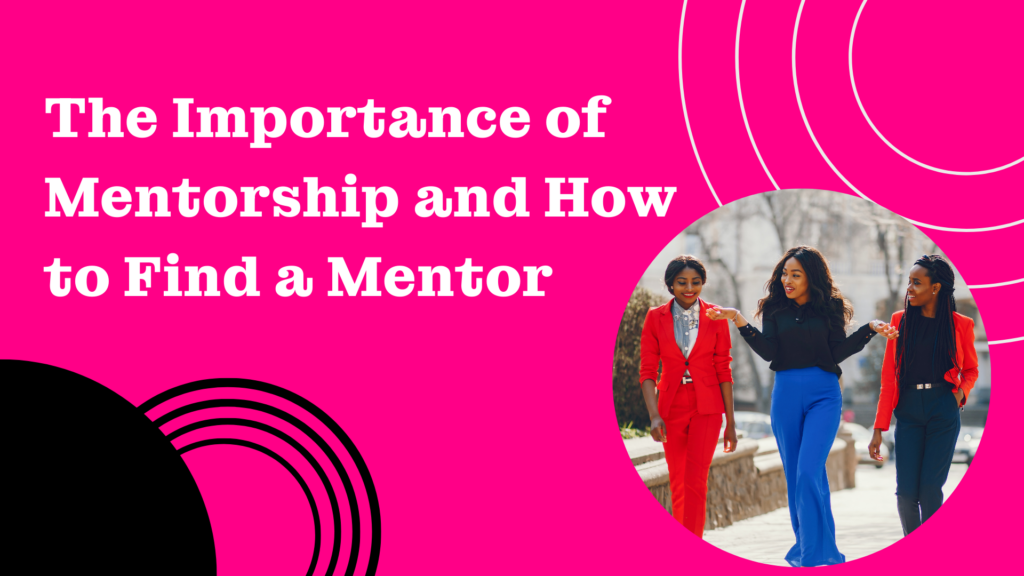
Mentorship is a powerful force in career advancement, especially for women of color navigating the sales industry, where we still have a dearth of women who look like us in leadership positions. Having a mentor means having someone in your corner to offer insights, guidance, and encouragement as you tackle new challenges and grow professionally. Research shows that mentorship can lead to higher confidence, valuable connections, and even faster promotions. Mentors provide wisdom that helps you avoid common pitfalls and learn strategies to thrive—empowering you to reach new heights in your career. Key Benefits of Having a Mentor Professional Growth and Skill Development: A mentor offers insights gained from experience, helping you sharpen the skills essential to success in your field. From honing your sales techniques to building confidence in client interactions, the guidance of a mentor can be transformative. Guidance and Support Through Challenges: Mentors help you navigate tough times. They offer solutions to workplace issues like overcoming bias or achieving work-life balance. With a mentor’s support, you can face and overcome the unique challenges that arise in your career. Building a Strong Network: A mentor is often well-connected, offering access to a network that might otherwise be difficult to reach. This can lead to job opportunities, introductions to other professionals, and an expanded professional circle that benefits your growth. Personal Development: Mentorship encourages growth beyond career achievements. A good mentor supports your journey toward resilience, mindfulness, and self-confidence, empowering you to bring your full self to work every day. Characteristics of a Good Mentor Relevant Experience: Look for a mentor who has worked in a similar field or role, as their insights will be especially relevant and actionable. Aligned Values: It’s crucial to find a mentor whose values reflect your own goals and aspirations. This alignment allows for trust and open communication. Willingness to Invest in Others: A mentor who genuinely enjoys helping others will make time for your questions, be attentive to your needs, and be dedicated to your success. Availability and Commitment: Make sure your mentor can commit to regular check-ins, whether weekly, monthly, or as your schedule allows. The best mentorship relationships have consistent communication and accountability. How to Find the Right Mentor Identify Your Goals: Before reaching out, define what you’re seeking in a mentor. Are you looking for industry knowledge? Help with skill development? Career advancement advice? Knowing your goals helps you identify the right fit. Explore Your Network: Sometimes, a mentor may already be in your existing network. Reach out to colleagues, LinkedIn connections, alumni groups, or communities like Sistas in Sales. SIS, in particular, offers a network of experienced professionals eager to support the next generation. Engage in Networking Events and Industry Meetups: Conferences, industry panels, and networking events provide excellent opportunities to connect with potential mentors. The annual SIS Summit, for example, brings together sales leaders and industry influencers, providing a perfect chance to build meaningful connections. Leverage Professional Organizations and Communities: Many organizations, including Sistas in Sales, offer formal mentorship programs or structured events that connect members with potential mentors who align with their career paths. Making the Ask: How to Approach a Potential Mentor Start with Respectful Outreach: When you reach out, express why you admire their work and how you think mentorship with them could be mutually rewarding. Personalize your message and share specific reasons why you see them as a fit. Define Your Expectations: Be clear about what you hope to gain from the mentorship. Whether it’s bi-weekly check-ins or advice on certain projects, defining expectations upfront helps establish a productive relationship. Show Your Commitment: Demonstrate your dedication to making the most of their mentorship. Come prepared to meetings, follow up on advice, and apply what you learn. This shows your respect for their time and dedication to growth. Tips for Building a Successful Mentor-Mentee Relationship Communicate Regularly and Consistently: Schedule regular check-ins to maintain a steady rhythm and build rapport. Consistent communication allows for meaningful feedback and deeper engagement. Stay Open to Feedback: Mentorship is a growth experience, so be prepared to hear constructive feedback. Embrace their insights, even if it means stepping out of your comfort zone. Show Appreciation and Recognize Their Investment: Acknowledge your mentor’s time, insights, and support. Simple gestures, like a thank-you message or sharing your progress, reinforce the value of their role in your journey. Mentorship as a Catalyst for Success Mentorship can be a transformative force in your career and life. Having a mentor not only brings practical skills and industry insights but also instills the confidence to pursue your goals unapologetically. If you’re ready to explore mentorship opportunities, consider joining a community like Sistas in Sales, where connections between experienced professionals and rising sales stars are at the heart of our mission. Your future is shaped by those who support and guide you—find your mentor, unlock your potential, and thrive.
The Future of Sales: How AI is Transforming the Industry
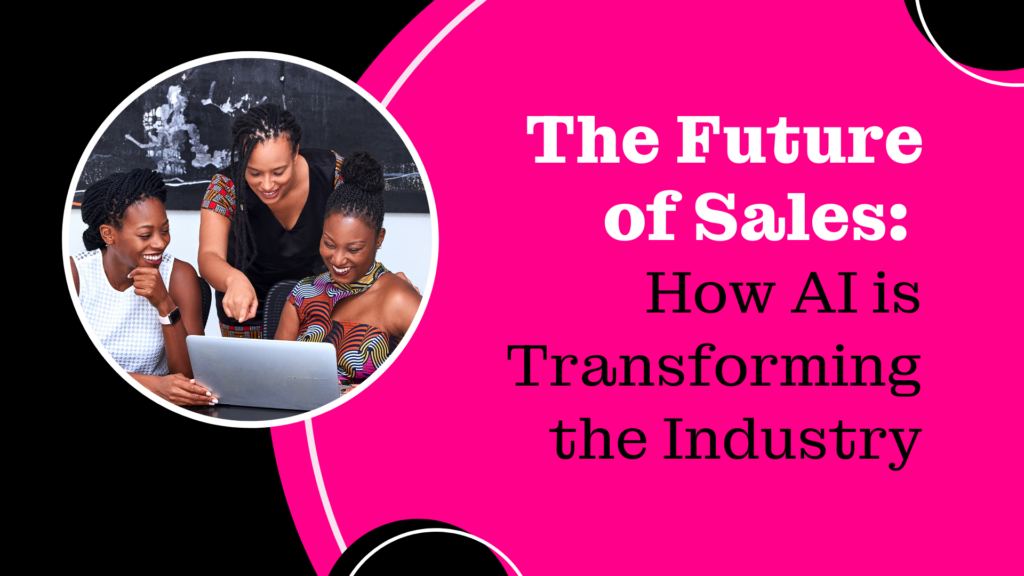
Artificial Intelligence (AI) is revolutionizing industries across the globe, and sales is no exception. As advances are made, the impact of AI on sales processes, productivity, and customer engagement is becoming increasingly significant. Understanding these changes and leveraging AI effectively in sales can provide a competitive edge. This blog explores the latest updates on AI in sales and offers actionable recommendations for salespeople and sales leaders to implement right away. Understanding AI and Its Capabilities in Sales AI in sales refers to the use of machine learning, natural language processing, and predictive analytics to enhance various aspects of the sales process. From automating routine tasks to providing deep insights into customer behavior, AI is transforming how sales teams operate. Current trends include AI-driven chatbots, advanced CRM systems, and predictive analytics tools that forecast sales outcomes with unprecedented accuracy. AI-Driven Sales Processes Lead Generation and Qualification: AI automates lead generation and scoring, ensuring that sales teams focus on the most promising prospects. Tools like HubSpot and Salesforce Einstein use AI to analyze vast amounts of data and identify high-quality leads. By implementing AI-powered lead scoring tools, sales teams can prioritize high-quality leads and focus their efforts more efficiently based on how qualified their prospects are. Sales Forecasting: AI enhances the accuracy of sales forecasts by analyzing historical data and current trends. Tools such as Clari and Aviso provide detailed sales predictions, helping teams plan more effectively. Utilizing AI-driven analytics helps refine sales forecasts, allowing for better planning and resource allocation. Personalized Customer Engagement: AI personalizes customer interactions by analyzing behavior and preferences. Tools like Drift (SalesLoft) and Conversica create tailored email campaigns and sales pitches, enhancing customer engagement. Research shows that personalized emails outperform emails that lack personalization, drawing a very strong 41% click-through rate on average when an email is properly personalized. Leveraging AI to create personalized email campaigns and sales pitches can resonate more effectively with individual customers. Enhancing Sales Productivity with AI Automating Administrative Tasks: AI reduces the time spent on administrative tasks by automating data entry and task management. CRM systems like Zoho and Pipedrive use AI to streamline these processes by automatically logging communications, updating customer records, scheduling follow-ups, and providing intelligent task reminders based on previous interactions, freeing up time for more strategic activities. Adopting AI-powered CRM systems automates routine tasks, allowing sales teams to focus on high-value activities. Intelligent Sales Assistants: AI assistants provide real-time insights and support during sales calls. Tools like Gong and Chorus (ZoomInfo) use AI to analyze conversations and offer actionable advice. Integrating AI sales assistants enhances the effectiveness of sales calls by providing real-time insights and support. Improving Customer Insights and Analytics Predictive Analytics for Customer Behavior: AI predicts customer behavior and preferences by analyzing data from various sources. Tools like InsideSales and Infer provide insights that help tailor sales strategies to individual customers. Predictive analytics works by examining past customer interactions, purchasing patterns, and other relevant data to forecast future behavior. This allows sales teams to anticipate customer needs, tailor their messaging, and time their outreach more effectively. Using predictive analytics to refine sales strategies enables more precise targeting of customers based on their predicted behavior, ultimately increasing the likelihood of successful conversions. Sentiment Analysis: AI analyzes customer sentiment from communications and feedback, providing a deeper understanding of customer emotions. Implementing sentiment analysis tools helps better understand and respond to customer emotions, improving overall customer satisfaction. AI for Sales Training and Development AI customizes training content based on individual needs and performance. Platforms like Lessonly (Seismic) and MindTickle use AI to analyze each salesperson’s strengths, weaknesses, learning pace, and preferences. By doing so, these platforms can recommend specific modules, exercises, and resources tailored to address individual gaps and enhance existing skills. This personalized approach ensures that training is relevant and engaging for each learner, leading to better retention and application of knowledge. Utilizing AI-driven training platforms delivers tailored training programs that address specific skills and knowledge gaps, resulting in more effective and efficient learning outcomes. AI is undeniably transforming the sales industry, offering tools and insights that enhance efficiency and effectiveness. Salespeople and sales leaders who embrace these technologies and adapt their strategies accordingly will be better positioned to succeed in a rapidly evolving landscape. By leveraging AI for lead generation, sales forecasting, customer engagement, and training, teams can achieve greater productivity and drive better results. Stay ahead of the curve and join the SIS community to learn more about AI in sales. Register for the 7th Annual SIS Summit today to network with industry experts and gain valuable insights into how AI can revolutionize your sales strategies. Don’t miss out on this opportunity to elevate your sales leadership skills and drive your team to success.
